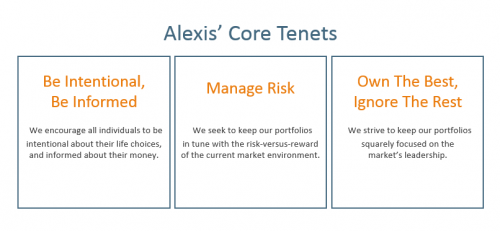Everyone understands, at some level, the need to save for long-term goals. Sending a child to college, buying a house, and preparing for retirement are typical goals that most of us have.
But how much of a difference does it make if we start saving now, versus later? The answer may surprise you.
Over the years working in institutional money management, I took many courses and went through various training programs. One of the most challenging – but most rewarding – was training to work on a bond desk for a global investment bank. The training was rigorous – or at least it felt that way at the time. We learned about bonds, yield-to-maturity, net present value, discounted future cash flows, etc.
Two of the most useful concepts were those clients hear me talk about frequently:
- Compounding – Compound interest is interest calculated on the initial principal and also on the accumulated interest of previous periods. This is related to the overall concept of compounding your money – that is, striving to lose less during a bear market so you can essentially make money on your money.
- Time Value of Money –This is the idea that money available at the present time is worth more than the same amount in the future, due to its potential earning capacity. This core principle of finance is that, provided money can earn interest, any amount of money is worth more the sooner it is received, i.e., “A fast nickel is better than a slow dime.” Time literally is money – the value of the money you have now is not the same as it will be in the future, and vice versa.*
How do these concepts relate to you and your everyday life? Actually, in a big way.
Imagine that you would like to have $1 million set aside at age 65. Assuming a 6% average annual return rate, and you start saving at age 25, you would only have to set aside $6,461 each year; if you start at age 35, you would need to set aside $12,649 annually; and if you wait until 45, you would need to save $27,185 for each of the remaining years to reach your goal.**
The difference is saving levels is startling, isn’t it? This clearly demonstrates why it’s a good idea to start saving for retirement as early as possible. Even if you can’t maximize your 401(k) because of other competing savings and income needs, at least start with an amount that is manageable. Additionally, from a psychological perspective, if you get accustomed to saving each month early in your working life, it will be much easier to maintain, as opposed to getting used to spending more, and then having to cut your spending to save an even larger amount.
You can also look at the concept of compounding in reverse. What if you decide to use credit to purchase something like an extravagant vacation or a car – something that will take several years to pay off? Given that you are paying interest on the loan over a protracted period of time, the result is like having a negative return on your money! Essentially, the compounding effect works in the opposite direction – assuming you are only making minimum payments each month, you are paying interest on the interest, which means it will take you longer to pay off the debt.
I am not against purchasing a car or going on a nice vacation. Rather, I suggest when buying a car and going on vacation, that you save the money prior to the purchase, rather than buying on credit.
Sometimes, the now-versus-later question is in the context of more practical needs. For example, spending money on an expense that will last for a limited amount of time – such as childcare, caring for an elderly parent, etc. You can defer saving temporarily to cover the expense and then start saving later, but what will the consequences be? These can be complex choices and I recommend sitting down with your financial planner to look at the trade-offs.
In closing, the time value of money and compounding are both a big deal in retirement planning, or in any planning situation where you have a substantial savings goal. However, what is fairly certain, is that saving now, rather than later, will tend to give you greater financial flexibility and freedom.
To understand whether you are saving enough to meet your goals, again, it may be worth sitting down with your financial advisor to crunch the numbers. In the meantime, below are a couple of calculators that may help provide a quick estimate of retirement plan projections:
As always, give us a call if we can assist you in running your numbers. It’s will be time well spent!
Be well,
Roberta
* Investopedia – Time Value of Money
** FFS Blog: 6/22/11 – The Difference Between Saving Now vs. Later Is Probably Bigger Than You Think
Alexis Advisors, LLC is a Registered Investment Advisor with the Commonwealth of Virginia. Information contained herein is for informational purposes only and is subject to various interpretations and timeframes, and should not be considered investment advice. Please contact Advisor promptly if there are any changes in your financial situation or investment objectives, or if you wish to impose, add or modify any reasonable restrictions to the management of your account. Since the confidentiality of internet email cannot be guaranteed, do not include private or confidential information such as passwords, account numbers, or social security numbers. Additionally, instructions having financial consequences such as trade orders, fund transfers, etc. should not be included in your email communications, as we cannot act on unconfirmed instructions received via email. Nothing in this transmission should be construed as an offer or solicitation to purchase or sell securities. Investments in securities and insurance products are not FDIC insured, not bank guaranteed, and may lose value. Advisor’s current Disclosure Brochure is set forth on Form ADV Part 2 and is available for your review upon request.


